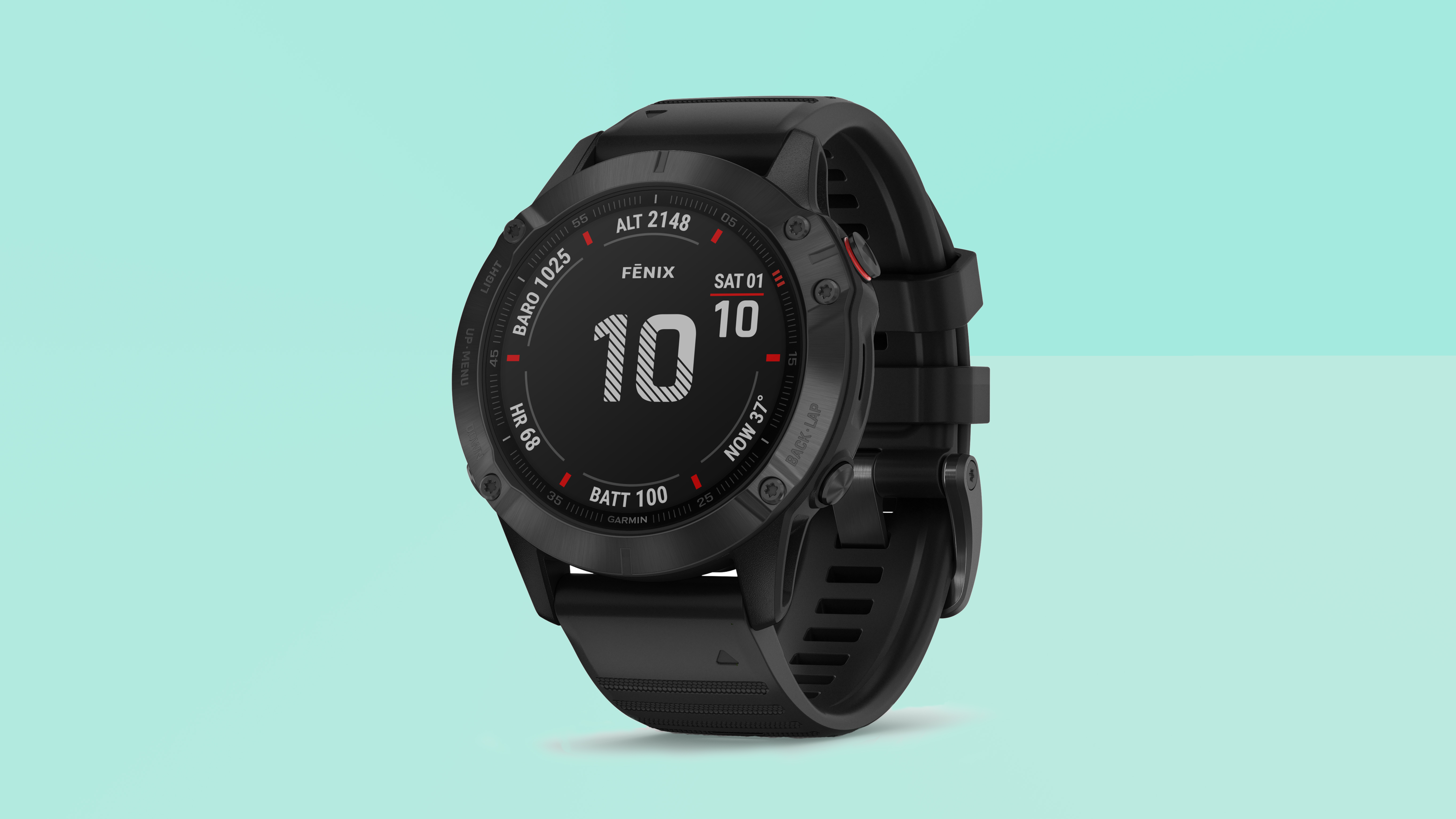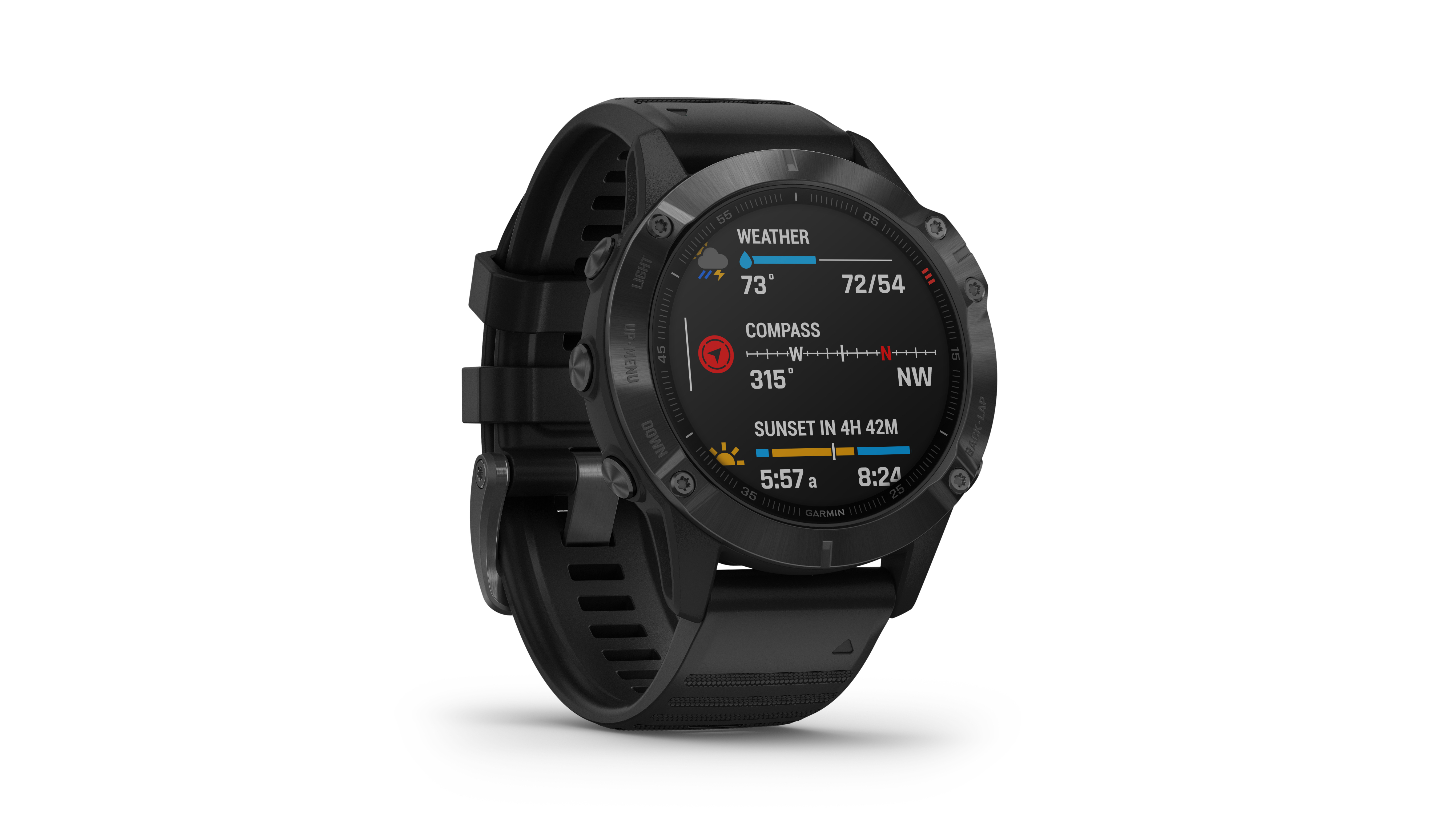Garmin Fenix 6x Pro Solar review: the ultimate outdoors watch
A big multisport smartwatch with titanium for lightness and the kitchen sink of sensors and apps - is this the ultimate multisport watch?


The Garmin Fenix 6x Pro Solar adds solar-boost to the already potent feature-set of the 6x, and drops weight into the bargain. Price aside, this is a powerful contender.
-
+
Does everything under the sun
-
+
Excellent data presentation
-
+
More sensors than Nasa
-
-
Can be complicated
-
-
Costly
Why you can trust T3

The Garmin Fenix 6x Pro Solar is the zenith of the kitchen sink approach to multisport watches. Following the trend of gradually intensivising functions, this 51mm watch not only tracks everyday fitness, provides coaching for targets such as marathons, and monitors fairly specific fitness indicators (such as vo2 Max and recovery times), but also offers a full-fat GPS/GLONASS navigational array, Wifi, Bluetooth and integration with playlists from Spotify, iHeartRadio, Deezer, or Amazon Prime Music.
The result is a chunky yet otherwise-practical training weapon – especially for keen outdoor athletes – which packs all the training, navigation and entertainment needs we can think of into a watch. On paper, it should be amongst the very best outdoor watches around.
A watch that packs an expedition-length battery life thanks to the inbuilt solar array. Interested? We certainly are. Here's our Garmin Fenix 6X Pro Solar review.
Garmin Fenix 6X Pro Solar Review: Fenix 6X Pro Solar VS Fenix 6 Pro
The Garmin Fenix 6x Pro Solar builds on many of the features of the Garmin Fenix 6 Pro, delivering on some levels a downright bewildering array of sensors, and related algorithmic calculations.
As both the 6x Pro solar and the 6 Pro units are ‘Pro’ designated, you get maps, music and WiFi, with which the vanilla 6 series is not graced, as well as the wide range of coaching features, wrist heart rate and companion phone app.
The 6X Pro solar swaps out the steel case of the 6 Pro in favour of titanium, a move that shaves a few grams, but most obviously boosts battery life with a solar array hidden within the Garmin Power Glass.
However, weight is where things get very tricky indeed, as in theory, the titanium Fenix 6x Pro Solar is nearly the lightest option, but in reality, Garmin’s vast range of variations make this a convoluted business.
Get all the latest news, reviews, deals and buying guides on gorgeous tech, home and active products from the T3 experts
The Garmin 6 comes in three screen sizes, 42, 47 and 51mm, and can be further complicated by adding ‘pro’ (music maps and wifi), sapphire glass, and solar - not all of these combinations are available together, and not all in the lighter titanium. So a 42mm 6S Pro with or without sapphire weighs in at 61g for a Steel body, the 47mm 6 Pro racks in at 83g Steel and 72g Titanium, and the 51mm 6X hits a whopping 93g for Steel. Finally, the 51mm Pro solar Titanium weighs 82g - the second lightest in the flagship range, but with the largest 51mm case - which gives a display size of 1.40" ( 35.56 mm) 280 x 280 pixels.
- Read our Garmin Instinct Solar review
- Garmin Fenix 6 Pro vs Apple Watch Series 5

Garmin Fenix 6X Pro Solar Review: build quality and ergonomics
The build quality of the Garmin Fenix 6x Pro Solar is pretty high, with titanium back and bezel - replete with torx screws for that rugged look - the only real let-down is the face. Unlike the sapphire models, the Solar model is equipped with ‘power glass’, which apart from charging the watch with sunlight, feels rather like Gorilla glass in use. Garmin claims the glass is scratch-resistant, but less robust than a Sapphire glass when all’s said and done.
This is not a touchscreen watch, so you’ll be needing all those five buttons, 007, but fortunately, they are labelled for those without a PHD in watch UI.
The ‘quickfit’ straps are a nice touch, removable with just the prod of a button, and although they’re dive-watch broad, the stock silicone strap does keep the rear-mounted HR monitor snug and relatively error-free.
Overall it’s not a subtle look, but for a high-end sports watch packing this much tech, an overall size of 51 x 51 x 14.90 mm comes as little surprise.
Garmin Fenix 6X Pro Solar Review: battery life and modes
Battery life is one of the many areas where the Garmin Fenix 6x Pro Solar brings a gun to a knife fight - not only does this beast offer reasonable battery life anyway (up to 21 days as a smartwatch and up to 60 hours of continuous GPS use), but there’s that tiny solar array boosting that figure when you’re outdoors. With that extra juice, you’ll get a lengthy 46 days in expedition mode, which is plenty enough for a decent Himalayan expedition. This is down to the Garmin Power Glass harvesting sunlight - Garmin claims that while indoor lighting will have some impact, it won’t be as effective as real sunlight.
The full list is here, but in short, you’ll get a week’s worth of training runs and more, unless you’re really hammering the GPS and apps.
- Smartwatch: up to 21 days +3 days
- GPS: up to 60 hours +6 hours
- GPS and music: up to 15 hours +1 hour
- Max battery GPS mode: up to 120 hours +28 hours
- Expedition GPS mode: up to 46 days +10 days
- Battery saver watch mode: up to 80 days +40 days
It’s also an effort of Himalayan proportions to get to grips with the range of sports, sensors and algorithmically-derived data available on the Garmin Fenix 6x Pro Solar. Just listing them all is an epic feat, with preloaded activity profiles for trail running, swimming, running, biking, hiking, rowing, skiing and golfing just as a start. The golf courses have their own mapping settings, natch, but there are also ski resort maps (and a backcountry ski profile too) to keep you busy, as well as normal maps with turn-by-turn navigation if you need it.
While this might all seem a bit much (and when you start to list it all, it is), there is good news. The smartphone app lets you pick your most likely profiles and upload them to the watch, so at a press of the top right button you’re straight into your customised list. In the case of running, many of the functions then fire up automatically, so while you might not be wondering what your altitude-adjusted VO2 max is, the Garmin Fenix 6x Pro Solar will just up and tell you. Indeed, the performance metrics displayed after a decent run are excellent, with lots of useful details ( VO2 max, heart rate zones, heart rate averages, recovery advisor) as well as simple analysis of them (type of training, how effective it was), which many complex devices make you dig around for.

Garmin Fenix 6X Pro Solar Review: activity tracking and precision
In other good news, the Garmin provides powerful activity tracking, easily picking up and monitoring heart rate, and getting a GPS fix within a few yards of the door when heading out on a run. The wrist-based heart rate monitoring isn’t by any stretch new, but Garmin have certainly ironed out some of the inconsistencies of older models - this never misses a beat. In-run tracking is neatly accomplished, making HR zone training simplicity itself, and the large screen pays dividends here, easily referred to while on the move.
Garmin Fenix 6X Pro Solar can display six different data fields during an activity, which can be selected from the menu - data includes HR, pace, cadence and lap timings. The PacePro feature from the other Fenix 6 models is particularly impressive, setting your target pace across hilly or difficult terrain, something competitive hill runners or OMM botherers will be rightly interested in.
Garmin Fenix 6X Pro Solar review: verdict
The Garmin Fenix 6X Pro Solar is completely impossible to pigeonhole, but rather brilliant too. Garmin has managed to integrate and make sense of many of the random bits of data from earlier models, decluttering the interface so that you get to what you want faster and easier.
On the downside, the huge array of general wellness tools, from water-drinking reminders to sleep tracking and stress monitoring can feel a little gimmicky, and reminiscent of now-near-defunct fitness trackers.
Those gripes aside, the battery life here is market-leading, the coaching tools and sensors excellent, and the ability to pull on some Bluetooth headphones, hit go and start running in comfort is no small feat. What price fitness convenience?
Liked this?

Mark Mayne has been covering tech, gadgets and outdoor innovation for longer than he can remember. A keen climber, mountaineer and scuba diver, he is also a dedicated weather enthusiast and flapjack consumption expert.